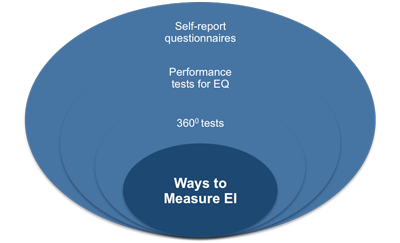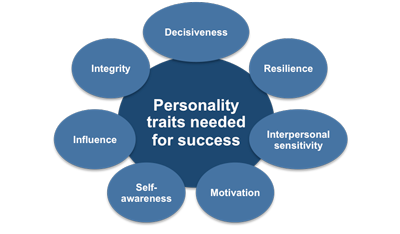Measuring Emotional Intelligence
Emotional intelligence is difficult to measure and some psychologists doubt that it can be assessed at all. However, many more believe that it can be measured but that there are obstacles to be overcome in doing so.
The easiest way to measure EQ is through what are called self-report questionnaires, although these are probably the weakest way to do it. These questionnaires ask you to report on your abilities, skills, and behaviors - for example, how effective you are in recognizing emotions, understanding emotions, etc. The flaw in this approach is that you may not accurately report your own skills and abilities.
Most of us have a tendency to exaggerate our accomplishments and minimize our shortcomings. The result is that self-report questionnaires often provide an inflated picture of our skills and abilities. Even if you were to be completely honest in your answers, you may lack the necessary insight to give accurate ones.
 |
One solution to the problem of self-report questionnaires is the use of 360 degree tests. This involves questions about your behavior being answered by people who know you, for example, friends, co-workers, boss, and subordinates.
The advantages of this approach are that other people are more likely to give an appraisal that is not inflated, and they are also more likely to report accurately how skillful you are in social interactions.
A third approach is to use performance tests to measure your EQ. These tests present you with practical problems and ask you to work out the correct answers. In other words, they ask you to actually demonstrate your EQ skills.
These tests are not as vulnerable to the problems facing self-report and 360 degree tests but they are much more difficult and expensive to construct. If any individual or organization can convince the business world that they have developed and validated an emotional intelligence test that can accurately and consistently measure EQ it will bring them considerable status and financial reward.
There are various proprietary tests on the market at the moment but unfortunately they all share the same lack of rigorous scientific validation that is accepted for IQ tests.
Before we can begin to make assessments of emotional intelligence, we need to know which personality traits specifically are involved. If we ignore the possible existence of business-related intelligence separate from both intellect and emotion it seems reasonable to assume that psychologists ought to be able to identify and measure accurately the qualities that determine job success.
These are generally agreed to be:
• Self-awareness - Your ability to control and to understand your own feelings
• Resilience - Your ability to work under pressure and to cope with changing demands
• Motivation - How much energy and effort you're prepared to put in to achieve your goals
• Interpersonal sensitivity - Your awareness of the needs and feelings of others and the ability to use it effectively in interactions and decision-making
• Influence - How well you are able to persuade others to agree with your point of view
• Decisiveness - The ability to arrive at a decision when faced with ambiguous information
• Integrity - Your willingness to do what is right and to stick to a course of action
The question is, should you try to measure and improve your emotional intelligence?
 |
The use of psychological measurement has always been rather controversial, and the measurement of emotional intelligence is no different. This may be due to the view that emotions are unpredictable, irrational, and something to be suppressed in favor of logic and reason.
Theories of emotional intelligence have helped to counter this view and offered the promise of a more balanced analysis of what it means to be intelligent about emotions. This has, in turn, expanded our understanding of the role that emotions play.
The use of emotional intelligence assessment in organizations has also been controversial. The definition of emotional competencies and the subsequent focus on work performance and assessment has led some critics to label the whole process as a return to an outmoded mechanistic way to increase performance and efficacy at the expense of the well-being of individual employees.
However, the core principles of emotional intelligence make clear that individuals are a complex combination of emotion and reason. Without a specific theory of emotional intelligence and the methods to assess it, employees may be limited to vague criticism related to their 'people skills.'
In order to improve on any emotional competence, people need to see quantifiable measurement of their baseline abilities and any improvement from it. In conclusion, reliable and valid measurement of specific emotional competencies, so long as it is provided in a positive way, helps to provide employees with insight into their strengths and areas for development.
This Assessing Emotional Intelligence Template enables you to record and define an action plan to develop your own emotional intelligence (EQ).
You may also be interested in:
Emotional Intelligence Models | Ability-Based Model | The Trait Model | ES-I Bar-On Model | Mixed Models.



